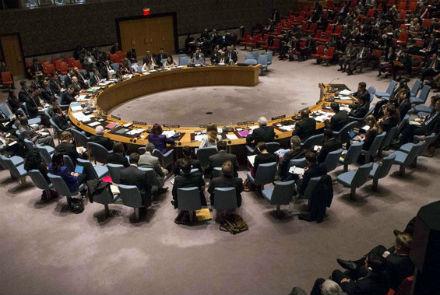Briefing the United Nations Security Council on Monday night, the Secretary-General’s Special Representative for Afghanistan Tadamichi Yamamoto said this year thousands of Afghans have been killed in the conflict and that “such human suffering and tragedy is unacceptable.”
He said the conflict also erodes the living conditions of people and deprives the country’s opportunities for development and growth.
He pointed out that there has been a 50 percent decrease in economic investment, and that financial resources spent on the conflict could be utilized for the economic prosperity of Afghanistan.
Yamamoto once again called on the Taliban to enter direct talks with the Afghan government without preconditions.
“We all know that the conflict in Afghanistan has no military solution,” he said. '
Yamamoto said all Afghans must come together and work through their problems and find ways to accommodate their differences, for their own joint future.
He said: “These are issues of mutual interests and high priorities to all parties. There are issues, such as lessening the civilian casualties. Identifying such common interests could be a starting point for dialogue.”
He stated that the vast majority of Afghans consider that their country should be a sovereign, united, Islamic country, free from interference by any foreign powers.
“This basic agreement on fundamental principles should make it possible to reach a peace agreement, as long as countries in the region are prepared to play their part in a positive, supportive way.”
He said it takes courage to enter into a peace process. “It is not an admission of defeat; it is a recognition of reality. An endless war ruins the country and impacts on people. The only path to a meaningful peace is through intra-Afghan dialogue.”
Yamamoto pointed out that the recent peace agreement with Hizb-e-Islami shows that government is prepared to negotiate on key issues, such as prisoner release, lifting of sanctions, and integration into the political life of Afghanistan.
“I welcome assurances made by the government that there would be no compromise of the rights of Afghans in implementing the peace agreement, including the rights of victims of gross violations of human rights.”
He said peace and stability in Afghanistan would also benefit regional countries from a security point and economically.
“I call upon each country of the region to ask itself what more it can do to help create an environment conducive to peace in Afghanistan and the region.
There are many strands for cooperation and steps that can be taken by the regional countries to improve the prospects for peace, such as increased consultations, exchanges of information and people-to-people contacts.”
Yamamoto also pointed out that Afghan refugees are returning home in record numbers.
“The country has received hundreds of thousands of returnees from both Pakistan and Iran in the past six months alone. While these returnees are being welcomed back to Afghanistan, they face an uncertain future, alongside the internally displaced, including half a million newly displaced just this year.”
Over one and a half million people are “on the move” this year, he said.
“It is likely that the coming year will see similar numbers of people. The sheer scale of this population movement will necessarily bring with it strains and pressure on the economy, on social services and could further swell the number of those seeking employment.”
He welcomed the response by the international community to the United Nations’ appeal for the provision of immediate life-saving assistance for the displaced and returnees and acknowledged the work that is being undertaken by government to put in place programs that will enable both the displaced and returnees to integrate into the economy and with their host communities.
“The longer term needs of integration must be addressed with urgency if we are to prevent more people sinking into absolute poverty. The scale of return will require further international support and flexibility in the use of existing funding mechanisms.
“Meanwhile, we must make greater efforts to ensure due recognition of the voluntary nature of return and for the process of return to be undertaken with dignity and respect,” he said.


